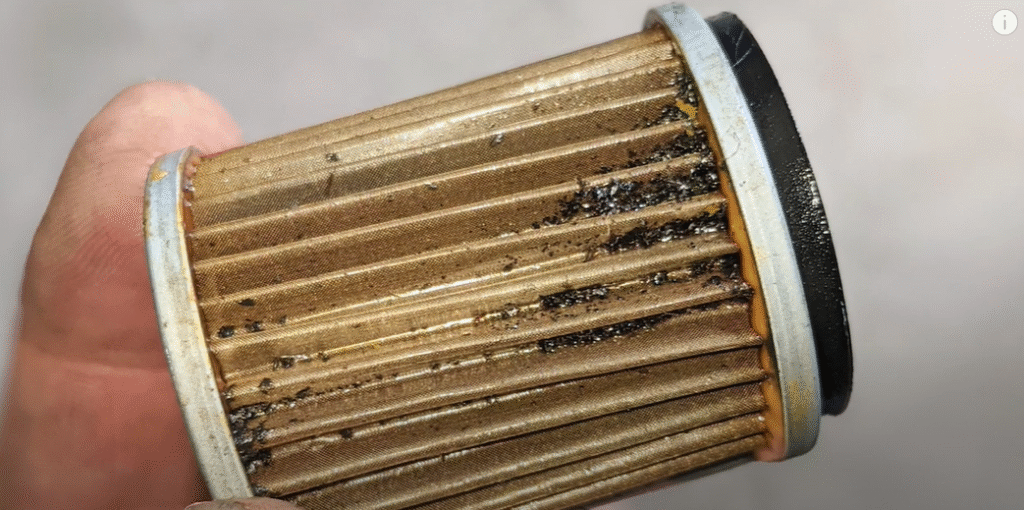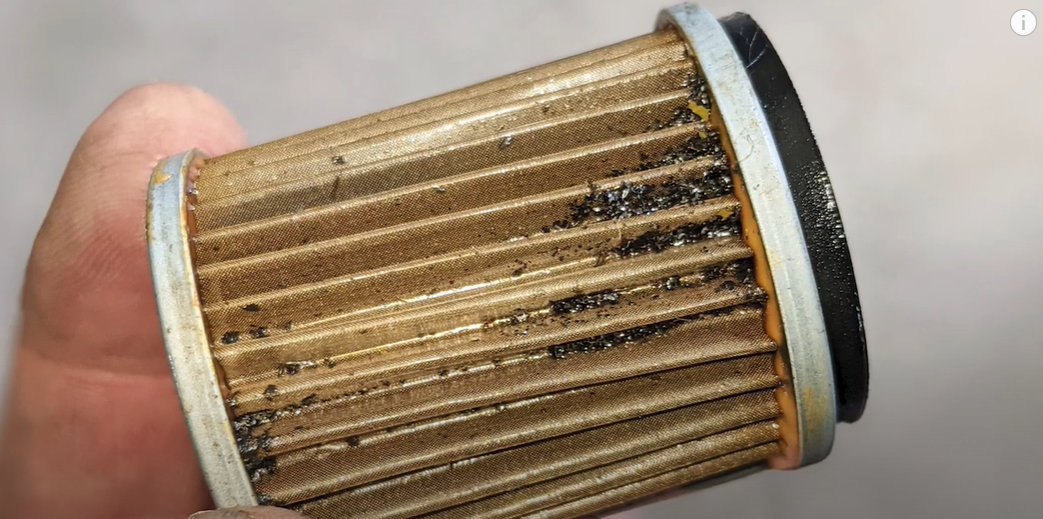If you find metal shavings in your oil, it’s important to get rid of them as soon as possible. Metal shavings can come from many different sources, but they all have the potential to damage your engine. The best way to remove metal shavings from your oil is to use a magnet.
You can either use a handheld magnet or a magnetic oil drain plug. If you don’t have a magnet, you can also try using a paper towel or coffee filter to remove the shavings.
- Remove the oil filter and set it aside
- Place a funnel over the opening of the oil pan and pour in a can of petroleum jelly
- Swirl the petroleum jelly around in the pan to coat the sides and bottom
- This will help to catch any metal shavings that may be in the oil
- Pour out the petroleum jelly and discard it along with any metal shavings that may have been caught in it
- Replace the oil filter and fill the oil pan with fresh oil

What to Do When You Find Metal Shavings in Your Oil?
If you find metal shavings in your oil, it’s important to take action immediately. Depending on the severity of the situation, you may need to change your oil or even replace your engine.
If you notice a small amount of metal shavings in your oil, it’s probably nothing to worry about.
This is sometimes caused by normal wear and tear on your engine and is nothing to be concerned about. However, if you notice a large amount of metal shavings, this is a sign that something is wrong with your engine. It could be something as simple as a loose bolt or gasket, or it could be something more serious like a cracked engine block.
If you find metal shavings in your oil, the first thing you should do is check your owner’s manual to see what the manufacturer recommends. If they recommend changing your oil, then do so as soon as possible. If they recommend replacing your engine, then take it to a mechanic and have them take a look at it.
Either way, don’t ignore the problem if you want to keep your car running smoothly.
What is the Best Way to Remove Metal Shavings?
If you’ve ever worked with metal, then you know that it often leaves behind small shavings. These shavings can be difficult to remove, especially if they’re stuck in a tight space. Luckily, there are a few ways that you can remove metal shavings quickly and easily.
One way to remove metal shavings is by using a magnet. This method works best if the shavings are small and loose. Simply pass the magnet over the surface of the shavings and they will be attracted to the magnet.
You can then lift the magnet away, taking the shavings with it.
Another way to removemetal shavings is by using duct tape. This method is great for larger pieces of shaving or for those that are stuck in place.
Simply place a piece of duct tape over the top of the shaving and then pull it away. The sticky nature of duct tape will cause the shaving to come up with it.
Finally, you can also use a vacuum cleaner to remove metal shavings.
This is probably the quickest and easiest method, but it does require access to a vacuum cleaner. Simply turn on the vacuum cleaner and hold it over the surface of the shaving.
Is It Bad to Have Metal Shavings in Oil?
If you find metal shavings in your oil, it’s not necessarily cause for alarm. The shavings may be simply from normal wear and tear on the engine parts. However, if there is a significant amount of metal in the oil, it could be an indication of a more serious problem.
If the metal shavings are coming from the engine itself, it could be due to several issues. The bearings could be wearing out, there could be excessive clearance between moving parts, or there could be a problem with the lubrication system. Any of these problems could lead to increased wear and tear on the engine, and eventually failure.
If you do find metal shavings in your oil, have it checked by a qualified mechanic as soon as possible to diagnose the problem and recommend the best course of action.
Can You Get Metal Shavings Out of a Motor?
If you have ever worked with metal, chances are you have dealt with metal shavings at some point. They can be pesky to get rid of and even more annoying when they end up in your motor. But don’t worry, there are a few ways you can remove them!
The first step is to check the oil level in your motor. If it is low, topping it off will help to remove any metal shavings that may be floating around. Next, use a magnet to try and attract any large pieces of metal out of the motor.
Finally, if there are any small pieces left behind, blow them out with compressed air or vacuum them up with a shop vac. With these steps, you should be able to successfully remove all the metal shavings from your motor!
what if you find metal shavings in your oil…
How Much Metal in Oil is Normal?
The amount of metal in oil is important to monitor because it can be an indication of engine wear. Metal particles in oil can come from many sources, including the engine itself, fuel additives, and contaminated oil. The amount of metal debris in used oil can be measured with a spectrometer.
There are no definitive guidelines for how much metal is considered normal, but generally speaking, less than 200 parts per million (ppm) is considered acceptable. Levels above 500 ppm may indicate excessive wear and warrant further investigation.
It’s important to note that the presence of metals in oil does not necessarily mean that there is a problem with the engine.
In some cases, small amounts of metal may be present due to the use of certain fuel additives or aftermarket oils. However, if you notice a significant increase in the amount of metal in your oil, it’s best to have your engine checked by a qualified mechanic.
How to Fix Metal Shavings in Engine
If you find metal shavings in your engine, don’t panic! This is a relatively easy problem to fix. Here’s what you need to do:
1. Remove the oil pan and drain the oil. This will help you get a good look at the bottom of the engine where the metal shavings are likely concentrated. 2. Clean out the oil pan thoroughly.
You want to remove all traces of metal shavings so they don’t end up back in your engine. 3. Inspect all of the engine’s moving parts for wear and tear. If any parts are excessively worn, it’s best to replace them before reassembling the engine.
4. Once everything is inspected and cleaned, reassemble the engine and add fresh oil. Be sure to use the correct type and amount of oil recommended by your vehicle’s manufacturer. 5.* Start the engine and check for leaks.
* If there are no leaks, congrats!
What Causes Metal Shavings in Engine
If you’ve ever taken your car in for an oil change and been told that there are metal shavings in your engine, you may be wondering what causes this. Metal shavings in an engine can come from a variety of sources, but the most common cause is wear and tear on engine parts. Over time, the moving parts in your engine will start to wear down.
This can happen due to several factors, including heat, friction, and chemicals. As these parts start to wear down, they’ll produce small metal shavings that will end up in your oil. While metal shavings in your oil aren’t necessarily a cause for concern, it’s something that you should keep an eye on.
If you notice an increase in the amount of metal shavings in your oil, it’s a good idea to have your car checked out by a mechanic. They’ll be able to tell if there’s anything wrong with your engine and make any necessary repairs.
Metal Shavings in Oil And Knocking
If you’ve ever heard a knocking noise coming from your car’s engine, it could be due to metal shavings in the oil. This is usually caused by wear and tear on the engine parts, and over time, small pieces of metal can break off and end up in the oil. The shavings can then circulate through the engine and cause damage to other parts.
If you think you might have metal shavings in your oil, it’s important to get it checked out by a mechanic as soon as possible. They’ll be able to drain the oil and check for any debris. If there are metal shavings present, they’ll need to be removed before you add new oil.
Otherwise, they could just end up back in the system and cause more damage.
In most cases, metal shavings in the oil are nothing to worry about and can be easily taken care of with a simple oil change. However, if left unchecked, they can lead to bigger problems down the road.
So if you hear that telltale knocking noise, don’t ignore it – get your car checked out right away!
Conclusion
If you notice metal shavings in your oil, it’s important to get rid of them as soon as possible. Metal shavings can come from a variety of sources, including the engine, transmission, and differential. While most metal shavings are harmless, they can cause problems if they accumulate in large enough quantities.
The easiest way to get rid of metal shavings is to change your oil and filter. This will remove any small particles that may be suspended in the oil. You should also have your vehicle inspected by a qualified mechanic to check for any larger pieces of metal that may be present.




Leave a Reply